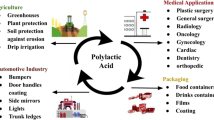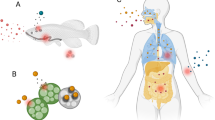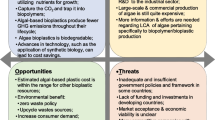Abstract
The current plastic pollution throughout the world is a rising concern that demands the optimization of biodegradation processes. One avenue for this is to identify plastic-degrading bacteria and associated enzymes from the gut bacteria of insect models such as Tenebrio molitor, Plodia interpunctella or Galleria mellonella that have the ability to ingest and rapidly degrade polyethylene. Therefore, this study takes part in understanding the role of the gut bacteria by investigating G. mellonella as a biological model feeding with a diet based on honeybee wax mixed or not with low-density polyethylene. Gut microbiome was analyzed by high throughput 16S rRNA sequencing, and Enterococcaceae and Oxalobacteraceae were found to be the major bacterial families. Compared to the control, the supplementation of low-density polyethylene did not cause significant modification of the bacterial microbiota at community and taxa levels, suggesting bacterial microbiome resilience. The bacterial proteome analysis of gut contents was encouraging for the identification of plastic degrading enzymes such as the phenylacetaldehyde dehydrogenase which participate in styrene degradation. This study allowed a better characterization of the gut bacteria of G. mellonella and provided a basis for the further study of biodegradation of polyethylene based on the bacterial microbiota from insect guts.





Similar content being viewed by others
Data availability
The sequencing data have been deposited with links to BioProject accession number PRJNA730794 in the NCBI BioProject database (https://www.ncbi.nlm.nih.gov/bioproject/). The mass spectrometry proteomics data have been deposited to the ProteomeXchange Consortium via the PRIDE partner repository with the dataset identifier PXD026446.
References
Aitchison J (1986) The statistical analysis of compositional data monographs on statistics and applied probability. Springer
Allonsius CN, Van Beeck W, De Boeck I et al (2019) The microbiome of the invertebrate model host Galleria mellonella is dominated by Enterococcus. Anim Microbiome 1:1–7. https://doi.org/10.1186/s42523-019-0010-6
Amobonye A, Bhagwat P, Singh S, Pillai S (2021) Plastic biodegradation: frontline microbes and their enzymes. Sci Total Environ 759:143536. https://doi.org/10.1016/j.scitotenv.2020.143536
Bachynska YO, Markina TY, Lykova IO, Kharchenko LP (2020) Efficiency of using Galleria mellonella L. (Lepidoptera: Pyralidae) for waste processing of synthetic polymers. Biodivers Ecol Exp Biol 1:45–54. https://doi.org/10.34142/2708-5848.2020.22.1.05
Bokulich NA, Dillon M, Evan B et al (2018) q2-sample-classifier: machine-learning tools for microbiome classification and regression. J open Res Softw 30:932. https://doi.org/10.21105/joss.00934
Bolyen E, Rideout JR, Dillon MR et al (2019) Reproducible, interactive, scalable and extensible microbiome data science using QIIME 2. Nat Biotechnol 37:852–857. https://doi.org/10.1038/s41587-019-0209-9
Bombelli P, Howe CJ, Bertocchini F (2017) Polyethylene bio-degradation by caterpillars of the wax moth Galleria mellonella. Curr Biol 27:R292–R293. https://doi.org/10.1016/j.cub.2017.02.060
Bonhomme S, Cuer A, Delort AM et al (2003) Environmental biodegradation of polyethylene. Polym Degrad Stab 81:441–452. https://doi.org/10.1016/S0141-3910(03)00129-0
Bowler MW (2013) Conformational dynamics in phosphoglycerate kinase, an open and shut case? FEBS Lett 587:1878–1883. https://doi.org/10.1016/j.febslet.2013.05.012
Brandon AM, Shu-Hong G, Renmao T et al (2018) Biodegradation of polyethylene and plastic mixtures in mealworms (larvae of Tenebrio molitor) and effects on the gut microbiome. Environ Sci Technol 52:6526–6533. https://doi.org/10.1021/acs.est.8b02301
Callahan BJ, McMurdie PJ, Rosen MJ et al (2016) DADA2: High-resolution sample inference from Illumina amplicon data. Nat Methods 13:581–583. https://doi.org/10.1038/nmeth.3869
Carpenter EJ, Smith KLJ (1972) Plastics on the Sargasso Sea surface. Science (80- ) 175:1240–1241. https://doi.org/10.1126/science.175.4027.1240
Cassone BJ, Grove HC, Elebute O et al (2020) Role of the intestinal microbiome in low-density polyethylene degradation by caterpillar larvae of the greater wax moth, Galleria mellonella. Proc R Soc B Biol Sci 287:9–11. https://doi.org/10.1098/rspb.2020.0112
Chen J, Bittinger K, Charlson ES et al (2012) Associating microbiome composition with environmental covariates using generalized UniFrac distances. Bioinformatics 28:2106–2113. https://doi.org/10.1093/bioinformatics/bts342
Colman DR, Toolson EC, Takacs-Vesbach CD (2012) Do diet and taxonomy influence insect gut bacterial communities ? Mol Ecol 21:5124–5137. https://doi.org/10.1111/j.1365-294X.2012.05752.x
Cook SM, McArthur JD (2013) Developing Galleria mellonella as a model host for human pathogens. Virulence 4:350–353. https://doi.org/10.4161/viru.25240
Dadd RH (1966) Beeswax in the nutrition of the wax moth, Galleria mellonella (L.). J Insect Physiol 12:1479–1492. https://doi.org/10.1016/0022-1910(66)90038-2
Díaz-Ramos À, Roig-Borrellas A, García-Melero A, López-Alemany R (2012) α-Enolase, a multifunctional protein: its role on pathophysiological situations. J Biomed Biotechnol 2012:156795. https://doi.org/10.1155/2012/156795
Dinh H, Semenec L, Kumar SS et al (2021) Microbiology’s next top model: Galleria in the molecular age. Pathog Dis 79:1–11. https://doi.org/10.1093/femspd/ftab006
Ellis JD, Graham JR, Mortensen A (2013) Standard methods for wax moth research. J Apic Res 52:1–17. https://doi.org/10.3896/IBRA.1.52.1.10
Engel P, Moran NA (2013) The gut microbiota of insects - diversity in structure and function. FEMS Microbiol Rev 37:699–735. https://doi.org/10.1111/1574-6976.12025
Fei C, Lu X, Qian Y et al (2006) Identification of Enterococcus sp. from midgut of silkworm based on biochemical and 16S rDNA sequencing analysis. Ann Microbiol 56:201–205. https://doi.org/10.1007/BF03175006
Fromont C, Riegler M, Cook JM (2017) Relative abundance and strain diversity in the bacterial endosymbiont community of a sap-feeding insect across its native and introduced geographic range. Microb Ecol 74:722–734. https://doi.org/10.1007/s00248-017-0971-5
Genest O, Wickner S, Doyle SM (2019) Hsp90 and Hsp70 chaperones: collaborators in protein remodeling. J Biol Chem 294:2109–2120. https://doi.org/10.1074/jbc.REV118.002806
Ghatge S, Yang Y, Ahn J-H, Hur H-G (2020) Biodegradation of polyethylene: a brief review. Appl Biol Chem 63:27. https://doi.org/10.1186/s13765-020-00511-3
Götz S, García-Gómez JM, Terol J et al (2008) High-throughput functional annotation and data mining with the Blast2GO suite. Nucleic Acids Res 36:3420–3435. https://doi.org/10.1093/nar/gkn176
Hammer TJ, Dickerson JC, Fierer N (2015) Evidence-based recommendations on storing and handling specimens for analyses of insect microbiota. PeerJ 3:e1190. https://doi.org/10.7717/peerj.1190
Johnston PR, Rolff J (2015) Host and symbiont jointly control gut microbiota during complete metamorphosis. PLoS Pathog 11:e1005246. https://doi.org/10.1371/journal.ppat.1005246
Jorjão AL, Oliveira LD, Scorzoni L et al (2017) From moths to caterpillars: ideal conditions for Galleria mellonella rearing for in vivo microbiological studies. Virulence 5594:0. https://doi.org/10.1080/21505594.2017.1397871
Jovel J, Patterson J, Wang W et al (2016) Characterization of the gut microbiome using 16S or shotgun metagenomics. Front Microbiol 7:1–17. https://doi.org/10.3389/fmicb.2016.00459
Klindworth A, Pruesse E, Schweer T et al (2013) Evaluation of general 16S ribosomal RNA gene PCR primers for classical and next-generation sequencing-based diversity studies. Nucleic Acids Res 41:1–11. https://doi.org/10.1093/nar/gks808
Kong HG, Kim HH, Chung J, hui, et al (2019) The Galleria mellonella hologenome supports microbiota-independent metabolism of long-chain hydrocarbon beeswax. Cell Rep 26:2451–2464. https://doi.org/10.1016/j.celrep.2019.02.018
Koutny M, Lemaire J, Delort AM (2006) Biodegradation of polyethylene films with prooxidant additives. Chemosphere 64:1243–1252. https://doi.org/10.1016/j.chemosphere.2005.12.060
Krams IA, Kecko S, Jõers P et al (2017) Microbiome symbionts and diet diversity incur costs on the immune system of insect larvae. J Exp Biol 220:4204–4212. https://doi.org/10.1242/jeb.169227
Kumar Sen S, Raut S (2015) Microbial degradation of low density polyethylene (LDPE): a review. J Environ Chem Eng 3:462–473. https://doi.org/10.1016/j.jece.2015.01.003
Kundungal H, Gangarapu M, Sarangapani S et al (2019) Efficient biodegradation of polyethylene (HDPE) waste by the plastic-eating lesser waxworm (Achroia grisella). Environ Sci Pollut Res 26:18509–18519. https://doi.org/10.1007/s11356-019-05038-9
Kundungal H, Gangarapu M, Sarangapani S et al (2021) Role of pretreatment and evidence for the enhanced biodegradation and mineralization of low-density polyethylene films by greater waxworm. Environ Technol 42:717–730. https://doi.org/10.1080/09593330.2019.1643925
Kwadha CA, Ong’Amo GO, Ndegwa PN et al (2017) The biology and control of the greater wax moth, Galleria mellonella. Insects 8:1–17. https://doi.org/10.3390/insects8020061
LeMoine CMR, Grove HC, Smith CM, Cassone BJ (2020) A very hungry caterpillar: polyethylene metabolism and lipid homeostasis in larvae of the greater wax moth (Galleria mellonella). Environ Sci Technol 54:14706–14715. https://doi.org/10.1021/acs.est.0c04386
Li WC, Tse HF, Fok L (2016) Plastic waste in the marine environment: a review of sources, occurrence and effects. Sci Total Environ 566–567:333–349. https://doi.org/10.1016/j.scitotenv.2016.05.084
Li W, Jin D, Shi C, Li F (2017) Midgut bacteria in deltamethrin-resistant, deltamethrin-susceptible, and field-caught populations of Plutella xylostella, and phenomics of the predominant midgut bacterium Enterococcus mundtii. Sci Rep 7:1–13. https://doi.org/10.1038/s41598-017-02138-9
Liang X, Sun C, Chen B et al (2018) Insect symbionts as valuable grist for the biotechnological mill : an alkaliphilic silkworm gut bacterium for efficient lactic acid production. Appl Microbiol Biotechnol 102:4951–4962
Lou Y, Ekaterina P, Yang S-S et al (2020) Biodegradation of polyethylene and polystyrene by greater wax moth larvae (Galleria mellonella L.) and the effect of co-diet supplementation on the core gut microbiome. Environ Sci Technol 54:2821–2831. https://doi.org/10.1021/acs.est.9b07044
Mayer MP, Bukau B (2005) Hsp70 chaperones: cellular functions and molecular mechanism. Cell Mol Life Sci 62:670–684. https://doi.org/10.1007/s00018-004-4464-6
Mereghetti V, Chouaia B, Limonta L et al (2017) Evidence for a conserved microbiota across the different developmental stages of Plodia interpunctella. Insect Sci 26:466–478. https://doi.org/10.1111/1744-7917.12551
Metwally HMS, Hafez GA, Hussein MA et al (2012) Low cost artificial diet for rearing the greater wax moth, Galleria mellonella L. ( Lepidoptera : Pyralidae ) as a host for entomopathogenic nematodes. Egypt J Pest Control 22:15–17
Mohanan N, Montazer Z, Sharma PK, Levin DB (2020) Microbial and enzymatic degradation of synthetic plastics. Front Microbiol 11:580709. https://doi.org/10.3389/fmicb.2020.580709
Montazer Z, Habibi Najafi MB, Levin D (2020) In vitro degradation of low-density polyethylene by new bacteria from larvae of the greater wax moth, Galleria mellonella. Can J Microbiol 67:1–10. https://doi.org/10.1139/cjm-2020-0208
Nowak B, Pajak J, Drozd-Bratkowicz M, Rymarz G (2011) Microorganisms participating in the biodegradation of modified polyethylene films in different soils under laboratory conditions. Int Biodeterior Biodegrad 65:757–767. https://doi.org/10.1016/j.ibiod.2011.04.007
Oberbeckmann S, Osborn AM, Duhaime MB (2016) Microbes on a bottle: substrate, season and geography influence community composition of microbes colonizing marine plastic debris. PLoS ONE 11:1–24. https://doi.org/10.1371/journal.pone.0159289
Oelschlägel M, Zimmerling J, Tischler D (2018) A review: the styrene metabolizing cascade of side-chain oxygenation as biotechnological basis to gain various valuable compounds. Front Microbiol 9:1–17. https://doi.org/10.3389/fmicb.2018.00490
Ojha N, Pradhan N, Singh S et al (2017) Evaluation of HDPE and LDPE degradation by fungus, implemented by statistical optimization. Sci Rep 7:1–13. https://doi.org/10.1038/srep39515
Oksanen AJ, Blanchet FG, Kindt R, et al (2013) Package ‘ vegan ’ version 2.5–2
Petriz BA, Franco OL (2017) Metaproteomics as a complementary approach to gut microbiota in health and disease. Front Chem 5:1–7. https://doi.org/10.3389/fchem.2017.00004
Peydaei A, Bagheri H, Gurevich L et al (2020) Impact of polyethylene on salivary glands proteome in Galleria melonella. Comp Biochem Physiol Part D Genomics Proteomics 34:100678. https://doi.org/10.1016/j.cbd.2020.100678
Peydaei A, Bagheri H, Gurevich L et al (2021) Mastication of polyolefins alters the microbial composition in Galleria mellonella. Environ Pollut 280:116877. https://doi.org/10.1016/j.envpol.2021.116877
Pivato AF, Miranda GM, Prichula J et al (2022) Hydrocarbon-based plastics: Progress and perspectives on consumption and biodegradation by insect larvae. Chemosphere 293:133600. https://doi.org/10.1016/j.chemosphere.2022.133600
Plastics Europe (2021) Plastics – the Facts 2021. https://plasticseurope.org/wp-content/uploads/2021/12/Plastics-the-Facts-2021-web-final.pdf (Lastly consulted on 15 November 2022)
R Core Team (2020) R: a language and environment for statistical computing. https://www.r-project.org/ (Lastly consulted on 15 November 2022)
Ruiz Barrionuevo JM, Vilanova-Cuevas B, Alvarez A et al (2022) The bacterial and fungal gut microbiota of the greater wax moth, Galleria mellonella L. consuming polyethylene and polystyrene. Front Microbiol 13:918861. https://doi.org/10.3389/fmicb.2022.918861
Sanchez-Hernandez JC (2021) A toxicological perspective of plastic biodegradation by insect larvae. Comp Biochem Physiol Part C Toxicol Pharmacol 248:109117. https://doi.org/10.1016/j.cbpc.2021.109117
Schlecht R, Erbse AH, Bukau B, Mayer MP (2011) Mechanics of Hsp70 chaperones enables differential interaction with client proteins. Nat Struct Mol Biol 18:345–351. https://doi.org/10.1038/nsmb.2006
Shao Y, Arias-Cordero EM, Boland W (2013) Identification of metabolically active bacteria in the gut of the generalist Spodoptera littoralis via DNA stable isotope probing using 13C-Glucose. J Vis Exp 1–8.https://doi.org/10.3791/50734
Shimao M (2001) Biodegradation of plastics. Curr Opin Biotechnol 12:242–247. https://doi.org/10.1016/S0958-1669(00)00206-8
Stefanini I (2018) Yeast-insect associations: it takes guts. Yeast. https://doi.org/10.1002/yea.3309
Sugeçti S (2021a) Pathophysiological effects of Klebsiella pneumoniae infection on Galleria mellonella as an invertebrate model organism. Arch Microbiol 203:3509–3517. https://doi.org/10.1007/s00203-021-02346-y
Sugeçti S (2021b) Biochemical and immune responses of model organism Galleria mellonella after infection with Escherichia coli. Entomol Exp Appl 169:911–917. https://doi.org/10.1111/eea.13092
Tang X, Freitak D, Vogel H et al (2012) Complexity and variability of gut commensal microbiota in polyphagous lepidopteran larvae. PLoS ONE 7:1–9. https://doi.org/10.1371/journal.pone.0036978
Tarayre C, Bauwens J, Mattéotti C et al (2015) Multiple analyses of microbial communities applied to the gut of the wood-feeding termite Reticulitermes flavipes fed on artificial diets. Symbiosis 65:143–155. https://doi.org/10.1007/s13199-015-0328-0
Tischler D (2015) Microbial Styrene Degradation, 1st edn. Springer International Publishing
Vilanova C, Baixeras J, Latorre A, Porcar M (2016) The generalist inside the specialist: gut bacterial communities of two insect species feeding on toxic plants are dominated by Enterococcus sp. Front Microbiol 7:1–8. https://doi.org/10.3389/fmicb.2016.01005
Wang S, Shi W, Huang Z et al (2022) Complete digestion/biodegradation of polystyrene microplastics by greater wax moth (Galleria mellonella) larvae: direct in vivo evidence, gut microbiota independence, and potential metabolic pathways. J Hazard Mater 423:127213. https://doi.org/10.1016/j.jhazmat.2021.127213
Warnecke F, Luginbühl P, Ivanova N et al (2007) Metagenomic and functional analysis of hindgut microbiota of a wood-feeding higher termite. Nature 450:560–565. https://doi.org/10.1038/nature06269
Wickham H (2009) ggplot2: elegant graphics for data analysis. Biometrics 67:678–679. https://doi.org/10.1111/j.1541-0420.2011.01616.x
Xu T, Pagadala V, Mueller DM (2015) Understanding structure, function, and mutations in the mitochondrial ATP synthase. Microb Cell 2:105–125. https://doi.org/10.15698/mic2015.04.197
Yang J, Yang Y, Wu WM et al (2014) Evidence of polyethylene biodegradation by bacterial strains from the guts of plastic-eating waxworms. Environ Sci Technol 48:13776–13784. https://doi.org/10.1021/es504038a
Yang Y, Yang J, Wu WM et al (2015) Biodegradation and mineralization of polystyrene by plastic-eating mealworms: part 2. Role of gut microorganisms. Environ Sci Technol 49:12087–12093. https://doi.org/10.1021/acs.est.5b02663
Zhu P, Pan X, Li X et al (2021) Biodegradation of plastics from waste electrical and electronic equipment by greater wax moth larvae (Galleria mellonella). J Clean Prod 310:127346. https://doi.org/10.1016/j.jclepro.2021.127346
Acknowledgements
We thank Samuel Latour for his dedicated work. We thank Nicolas Poncelet (ULiège) for his experimental assistance. We thank also Dr. Dominique Baiwir and Prof. Gabriel Mazzucchelli of GIGA-Proteomics team (ULiège) (https://www.gigaproteomics.uliege.be/cms/c_4214690/en/gigaproteo) that directed the protein sequencing. We also thank Hillary Fischer (ULiège), a native English speaker, for proof reading the manuscript.
Funding
This work was supported by internal resources.
Author information
Authors and Affiliations
Contributions
GN performed the sampling and the rearing of Galleria mellonella. SM, FD and FF conceived the study and provided the financial support. LS and ARS did the laboratory work. GN and LS analyzed the data and interpreted the results. GN wrote the first draft complemented by LS and FF. All the authors were involved in the writing process (review and editing).
Corresponding author
Ethics declarations
Competing interests
The authors declare no competing interests.
Additional information
Publisher's note
Springer Nature remains neutral with regard to jurisdictional claims in published maps and institutional affiliations.
Supplementary Information
Below is the link to the electronic supplementary material.
Rights and permissions
Springer Nature or its licensor (e.g. a society or other partner) holds exclusive rights to this article under a publishing agreement with the author(s) or other rightsholder(s); author self-archiving of the accepted manuscript version of this article is solely governed by the terms of such publishing agreement and applicable law.
About this article
Cite this article
Noël, G., Serteyn, L., Sare, A.R. et al. Co-diet supplementation of low density polyethylene and honeybee wax did not influence the core gut bacteria and associated enzymes of Galleria mellonella larvae (Lepidoptera: Pyralidae). Int Microbiol 26, 397–409 (2023). https://doi.org/10.1007/s10123-022-00303-3
Received:
Revised:
Accepted:
Published:
Issue Date:
DOI: https://doi.org/10.1007/s10123-022-00303-3




